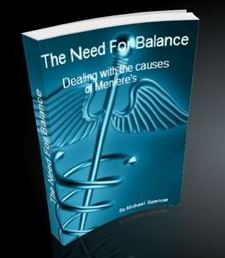Manganese and Meniere’s Disease
Posted Under: Meniere's Disease Triggers & Causes,Meniere's Disease and Nutrition
Is Manganese relevant in Meniere’s Disease?
Table of Contents
The role of Manganese in Meniere’s Disease

Is there a role for manganese in either the treatment or as a causative factor with Meniere’s Disease? Some nutritionists and doctors specializing in cellular nutrition may believe it can help relieve symptoms while most ENT doctors will probably know nothing about it or dismiss it. If it doesn’t show up on peer reviewed studies or papers in PubMed then most doctors may dismiss it, regardless of any other reports or evidence.
Timothy Haine MD, who writes on the internet about Meniere’s, dismisses the use of manganese as just another in his long list of “placebo effect”, claiming there are zero peer reviewed studies published on PubMed. This is the man who refers to the bioflavonoids from lemon and vitamin C in Lipoflavonoid as a, “mysterious substance” as he consigns that too to his list of ‘Placebo’ effect probabilities.
Both vitamin C and flavonoids combined with other nutrients have been used with great success over the years for Meniere’s and to so flippantly dismiss their successful use as “placebo” shows a lack of understanding, or willful ignorance as to the importance of both reducing inflammation and improving micro-circulation through nutrition in Meniere’s disease. It also shows a complete disdain and ignorance of the importance of nutrition in general. Shocking perhaps, but unsurprising considering the almost total reliance on synthetic drugs in mainstream medicine.
The easy answer to this attitude is to ask the question, how many Meniere’s sufferers has mainstream medicine actually “cured”? Moreover, how many Meniere’s sufferers can live even partially symptom free through synthetic drugs? Ask a medical doctor how much they studied nutrition in their years of medical school and you will be lucky if they answer that it was more than one afternoon. Which drugs are used for treating what condition will be well known or easily accessible yet a significant understanding of nutritional biology, the very foundation of human health, is often sadly lacking. Many drugs block or prevent natural biological processes while the right nutrition can help the body balance these processes and correct them when there is dysfunction.
In the experiences of Meniere’s Help readers who have contacted us over 12 years, for many the right nutrition has helped them stay symptom free and lipoflavonoid is best used in conjunction with other supplements ( See more about supplementation here )
Unfortunately the testimonials of real sufferers who are the very people who experience every symptom, pain, relief and cure, are too often discarded as mere “hearsay”. The fact is that very few clinical studies will ever be done to prove the effectiveness or curative powers of anything natural because this cannot be patented and profited from by the huge pharmaceutical corporations. Research into synthetic drugs will receive multi million dollar funding simply because these drugs can be patented and profited from.
With all this said, regarding peer reviewed studies on PubMed that Haine bases his opinions on, there is indeed a south American study (translated from Spanish) indexed: ‘Efficacy of the treatment of Ménière’s disease with oligoelements’
Oligoelements are trace elements including manganese and magnesium.
The 2003 study published in the Anales of Otorrinolaringologicols Ibero-Americanos stated:
“There are significant differences of better results in Ménières treated with olygoelements.”
The study did a split test of 68 Meniere’s sufferers. 34 were treated with drugs and 34 treated with oligoelements.
The reported results were: “In the descriptive statistics we find better results in the Ménières treated with olygoelements than in those that were not treated”
Manganese was used in this Meniere’s Disease study
[Oligo Elements are bioavailable forms of trace minerals that can be rapidly absorbed. Oligo Elements unlock the various metabolic processes which generate functional or infectious diseases. These bioavailable elements work by normalizing enzyme and hormonal functions in order to regulate homeostasis (balance) in the body.]
There is little to no literature about manganese deficiency being related to Meniere’s directly, so why might it help?
Doctor Laurent Bannock. author of The Clinical Nutrition Desk Reference recommends manganese in his supplementation regimen for Meniere’s and states that , “Deficiencies have been linked to ear problems”
Manganese is a component of manganese superoxide dismutase (MnSOD) which has been shown to be a powerful antioxidant that fights inflammation. Reducing inflammation by supporting the immune system with powerful antixodants is one of the main functions of the supplement regimen talked about on Meniere’s Help that has worked so well for well over a decade for thousands of sufferers.
Manganese plays an important role in a number of physiologic processes as a constituent of multiple enzymes and an activator of other enzymes.
Manganese superoxide dismutase (MnSOD) is the principal antioxidant enzyme in the mitochondria. Because mitochondria consume over 90% of the oxygen used by cells, they are especially vulnerable to oxidative stress. The superoxide radical is one of the reactive oxygen species produced in mitochondria. MnSOD catalyzes the conversion of superoxide radicals to hydrogen peroxide, which can be reduced to water by other antioxidant enzymes. [Mitochondria is found in large numbers in most cells, in which the biochemical processes of respiration and energy production occur. Often known as the powerhouse of the cells]
Although manganese deficiency is not common, deficiency has been linked with several serious diseases such as osteoporosis, type 2 diabetes and epilepsy but not directly linked to Meniere’s. It has however been linked to some symptoms of Meniere’s and other conditions with links to Meniere’s.
Possible effects of manganese deficiency are thought to be: nerve disorders, ringing in the ears (tinnitus), vertigo, memory loss, glucose intolerance , and epilepsy.
Conversely, at very high levels of exposure manganese can be toxic, and has been linked to several conditions including Parkinson’s Disease and thyroid dysfunctions.
With that in mind, the importance of balanced nutrition rather than stand alone supplementation can not be underestimated. As vitamins, minerals, trace elements and enzymes all work in synergy it is important that the balance is right.
Comprehensive supplementation
Dr Tim Wood Ph.D explains in ‘Comprehensive Supplementation Delivers What Stand-Alones’ Can’t‘:
“Many people approach nutritional supplementation in piecemeal fashion.
For instance, some use stand-alone vitamin E products to promote cardiovascular health. Others buy stand-alone calcium supplements to protect against osteoporosis.
Some use vitamin C and zinc to reduce cold and flu symptoms. And still others change their supplement regime every month, according to the latest magazine articles they have read.None of these approaches –focusing on one or two essential nutrients and ignoring all the others–is satisfactory. In fact, they run counter to the most basic principles of nutrition and health.
Our bodies, and each of the cells that compose them, are complex, living systems comprising diverse structures (organs and organelles) that carry out a multitude of integrated biological functions.
At the cellular level, membranes, mitochondria, ribosomes, and the nucleus work in concert to regulate the conveyance of materials into and out of the cell; metabolize carbohydrates and fats; synthesise proteins; and guide cellular growth, division, and differentiation.
Similarly, our bodies’ organs have distinct but integrated functions. Our digestive, circulatory, nervous, skeletal, and immune systems collaborate to allow us to acquire and break down foods, absorb and transport nutrients, detoxify metabolites, and fight infections.
All these processes, at both the cellular and whole-body levels, are intimately linked in the web of interactions we call “life.”
The well-being of the whole depends on the integrity and immutable function of all the parts; and in this sense, health is truly holistic.
As complex, integrated systems, our cells and our bodies require a full comlement of essential vitamins and minerals to survive and remain healthy.
The B vitamins–thiamine, riboflavin, niacin, pantothenic acid, pyridoxine, folic acid and cyanocobalamin–for example, are essential to cellular metabolism (energy usage and the synthesis of proteins, DNA, and other biological compounds).
We require vitamin C for the synthesis of connective tissues.
We need vitamin D, vitamin K, calcium, magnesium, and phosphorus for normal bone development. Copper, zinc, manganese and selenium are necessary for peak enzyme structure and function.
The list goes on, but the salient point is this: All the essential nutrients are needed all the time.
Withhold just one nutrient, or provide too much or too little of it, and a given aspect of metabolism slows.
And because our bodies are integrated systems, when one component or function slows, our overall health deteriorates.
We also need a diverse array of antioxidants; that is, molecules that neutralize free radicals and prevent oxidative damage.
Vitamins C and E are the best known of the dietary antioxidants.
But for complete, long-term protection, we need broader antioxidant defenses. In other words, we require a more extensive spectrum of antioxidant compounds, some of which are water-soluble, some fat-soluble, some that neutralize one class of free radicals (e.g., hydroxyl anions), and some that neutralize another (e.g., singlet oxygen).
Furthermore, various antioxidants accumulate in and protect different parts of the body.
Vitamin C is thought to accumulate in the lens of the eye where it affords protection from cataracts.
Two carotenoids–beta-carotene and lutein–accumulate in the skin and protect it from the sun’s damaging rays.
Lutein also accumulates in the macula of the eye, reducing oxidative stress and the risk of macular degeneration.
Vitamin E is absorbed into cell membranes, protecting them from oxidative stress.
Coenzyme Q10 protects mitochondria (the powerhouses of the cell) from free-radical damage.
And some bioflavonoids are thought to be important in protecting the integrity of blood vessels.In short, comprehensive antioxidant protection requires that we consume not only vitamins C and E, but also a full spectrum of antioxidant molecules, all of which are essential for long-term health.
In summary, then, our bodies’ cells are complex, integrated living systems requiring all the essential vitamins, antioxidants and minerals–in adequate and balanced amounts–to survive and thrive.
Provide just one of the essential nutrients in insufficient amounts, or provide less than broad-spectrum antioxidant protection, and cellular function declines and our overall health deteriorates.
These fundamental principles provide the basis for nutritional approaches to long-term health.
Importantly, they apply both to diet and supplement use. The importance of a balanced and varied diet is self-evident. We know that it is important to eat a diet that supplies a wide array of nutrient-dense foods; a diet rich in fruits and vegetables and one that supplies all the essential micro-nutrients, including the right amounts and kinds of carbohydrate, protein, and fat.
It is just as important to take a comprehensive and balanced approach to nutrient supplementation.
Research has shown that diets in industrialized countries generally fail to supply even minimal levels of many of the essential vitamins, antioxidants and minerals.
These deficits are particularly worrisome for vitamins A, E and B6, as well as for folate, calcium, magnesium, zinc and copper.
Furthermore, we now know that advanced levels of many of the essential nutrients–including vitamin E, vitamin D, and selenium–far in excess of Recommended Daily Allowances, are required to support long-term health.
As such, supplementing our diets with just one or two of the essential nutrients is not enough.
Each of us needs to take a complete vitamin, antioxidant, and mineral supplement as the foundation for our supplementation program.
The nutritional products you choose should provide all the essential nutrients. They should comprise a complete range of cofactors (e.g., choline) and a diverse group of antioxidants (including carot-enoids and bioflavonoids) –nutrients that have not traditionally been considered essential but which are now known to be required for long-term health.
Furthermore, a comprehensive supplement must provide the nutrients in balanced amounts and at doses shown to promote lifelong health.
None of us would think of limiting our diets to just broccoli and green tea just because we have read that both of these foods can help reduce the risk of cancer.
Common sense forbids it. Apply this same common sense and the fundamental principles of nutrition in choosing your nutritional supplements. Choose a high quality, comprehensive nutritional supplement as the basis of your program. Your health depends on it.”
Although there is no direct link to Meniere’s from manganese deficiency, there have been studies showing links to ear problems and the use of manganese as part of supplement regimen is known to be beneficial. Manganese may not hold the same importance to Meniere’s as Magnesium but as an important part of balanced dietary intake it should not be underestimated.
Dietary changes and supplementation is not thought of as either a treatment or a cure. People can live completely or almost completely symptom free as a result of the strengthening of their immune system through supplementation and a healthy balanced diet free of health damaging processed and junk foods.
Identifying and eliminating the individual root cause and triggers is the only way to actually cure yourself from Meniere’s completely. This is something we have been focusing on for the past 7 years and continue to do so.
It can be done, has been done and is being done all the time.
Food sources of manganese include: Pineapple (raw or juice), Pecans, Almonds, Peanuts, oatmeal, Raisin bran cereal, Brown rice, Whole wheat, beans, Spinach, Sweet potato, Tea (green & black), garlic, grapes, raspberries.
sources: NIH, The Clinical Nutrition Desk Reference (Dr Bannock), Linus Pauling Institute – Oregon State University, USDA.
If you found this article useful Click here to support Meniere’s Help paypal.me/menieres
Related articles:
by Mike Spencer
Founder of Menieres-Help.Com
Researcher & Author of ‘Managing Meniere’s Disease and The Need for Balance – Dealing with the Causes of Meniere’s
Help other Meniere’s sufferers. Have you used Manganese supplementation with Meniere’s or have you been tested and found to be deficient? Tell us all about it in the comments boxes below or email Mike at meniereshelp@gmail.com
References/Further reading:







